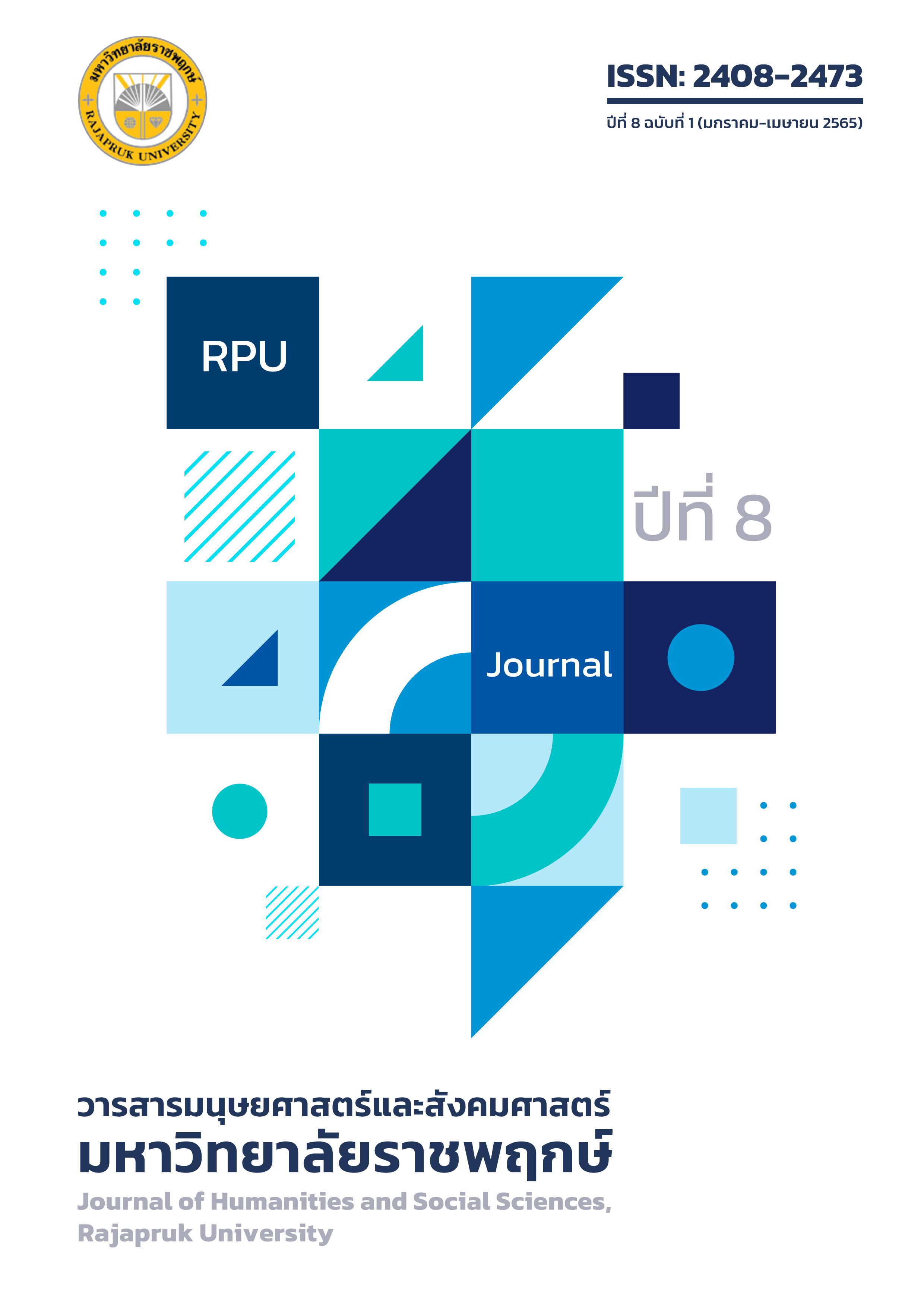The Impact of the Technological Changes toward the Accountants’ Development in the Digital Age
Main Article Content
Abstract
The article aims to demonstrate the impact of the technological changes toward the accountants’ development in the digital age. Such impact is known as Artificial Intelligence (AI), so there is the following question asking if one who studies Accounting will still not be unemployed. Inevitably, as the consequence, the accountants in the digital age have to do something called “Reskilling” the technologies proposing the direct effect to the accounting profession that is so called “Cloud Accounting”. It is the utilization of accounting software to improve and optimize the business process. The program helps do such tasks as account coding, book-keeping, and bank reconciliating. There is an effort to create the Accounting Artificial Intelligence software to operate as well as the accountants or book-keepers in scanning documents: cheques, receipts, payment vouchers, etc., and uploading to Cloud. Income and expense recording, including book-keeping, may be replaced with the automatic system by the use of account software. In this case, AI will take the place of doing the document work. However, the supporting information for the administrative decision is still required the high-skilled accountants to analyze the organization’s data by applying the data analyzing instrument and other technologies to boost up the working process. It is also a guideline to optimize the organizational capability in order to enable the organization to catch up with the social changes and economy in the digital age. All of these are the required qualification and roles of accountants in the digital age.
Article Details
References
กมลภู สันทะจักร์ และ กนกศักดิ์ สุขวัฒนาสินิทธิ์. (2560). คุณลักษณะนักบัญชีที่พึงประสงค์ในยุคไทยแลนด์ 4.0 ของหน่วยราชการในประเทศไทย. มหาวิทยาลัยศรีปทุม.
คณะพาณิชยศาสตร์และการบัญชี จุฬาลงกรณ์มหาวิทยาลัย. (2563). ทางรอดนักบัญชียุคเศรษฐกิจดิจิทัลต้องยกระดับเป็นคู่คิดซีอีโอ. ค้นเมื่อวันที่ 10 ตุลาคม 2563, จาก https://www.Bangkokbiznwes.com
คมกริช นันทะโรจพงศ์ เฉลิมชัย กิตติศักดิ์นาวิน และ นลินณัฐ ดีสวัสดิ์. (2560). เครื่องมือการพัฒนาองค์การในยุคเศรษฐกิจดิจิทัลสำหรับการเป็นองค์การที่มีขีดสมรรถนะสูง. วารสารบริหารธุรกิจ เศรษฐศาสตร์และการสื่อสาร, มหาวิทยาลัยนเรศวร, 12(2): 25-28.
จิราพร กรัตเพ็ชร์ และ ดารารัตน์ โพธิ์ประจักษ์. (2561). ผลกระทบของความเป็นมืออาชีพของนักบัญชีที่มีต่อคุณภาพกำไร. วารสารธุรกิจปริทัศน์ มหาวิทยาลัยหัวเฉียวเฉลิมพระเกียรติ, 10(2): 107-110.
ฐปนพรรษ์ นุทกาญจนกุล. (2560). ผลกระทบและการเตรียมความพร้อมของนักบัญชีไทยต่อปัญญาประดิษฐ์. การค้นคว้าอิสระบัญชีมหาบัณฑิต.มหาวิทยาลัยธรรมศาสตร์.
ณัฐชา วัฒนวิไล และ ภัสพร ตั้งใจกตัญญู. (2555). การประเมินตนเองเกี่ยวกับศักยภาพนักบัญชีมืออาชีพของบัณฑิตใหม่คณะบัญชี มหาวิทยาลัยกรุงเทพ. วารสารบริหารธุรกิจเทคโนโลยี มหานครมหาวิทยาลัยเทคโนโลยีมหานคร.
นันทวรรณ บุญช่วย. (2563). ยุคพลิกผันทางเทคโนโลยีกับการพัฒนานักบัญชีนวัตกร. วารสารบริหารธุรกิจและสังคมศาสตร์, มหาวิทยาลัยรามคำแหง, 3(1): 16-22.
นันทวรรณ วงค์ไชย. (2552). ผลกระทบของความเป็นมืออาชีพและจรรยาบรรณวิชาชีพที่มีต่อคุณภาพการสอบบัญชีของผู้สอบบัญชีรับอนุญาตในเขตกรุงเทพมหานคร. วิทยานิพนธ์บัญชีมหาบัณฑิต.มหาวิทยาลัยมหาสารคาม.
นิพันธ์ เห็นโชคชัยชนะ. (2559). ความหมายและขอบเขตของการบัญชี. วารสารวิชาชีพบัญชี, 12(35): 86–97.
นภัทร จันทรจตุรภัทร. (2562). ความสัมพันธ์ระหว่างการมุ่งเน้นสมรรถนะทางด้านวิชาชีพบัญชีแบบมืออาชีพและประสิทธิภาพการปฏิบัติงานของนักบัญชีในประเทศไทย. วารสารการบัญชีและการจัดการ มหาวิทยาลัยมหาสารคาม, 12(1): 114-118.
เพ็ญนภา เกื้อเกตุ ภูริชาติ พรหมเต็ม และ วิโรจน์ ไพบูลย์เวชสวัสดิ์. (2563). ความสัมพันธ์ระหว่างความเป็นมืออาชีพของนักบัญชียุคดิจิทัลและประสิทธิภาพการดำเนินงานของกิจการห้างหุ้นส่วนจำกัด ในจังหวัดยะลา. วารสารการบัญชีและการจัดการ มหาวิทยาลัยมหาสารคาม, 12(1): 155-158.
ภาวุธ พงษ์วิทยภานุ. (2560). กรุงเทพธุรกิจ 10 อาชีพโดนหุ่นยนต์ (AI) แทนที่. ค้นเมื่อวันที่ 21 มกราคม 2563, จาก: http://www.bangkokbiznews.com/blog/detail/642157
ศิรประภา ศรีวิโรจน์ และ กนกวรรณ เอี่ยมชื่น. (2562). นักบัญชีในยุค 4.0. วารสารวิชาการมหาวิทยาลัยอีสเทิร์นเอเซีย ฉบับสังคมศาสตร์และมนุษยศาสตร์.
ศิริรัฐ โชติเวชการ. (2561ก). พัฒนาการของระบบบัญชีคอมพิวเตอร์ที่น่าจับตามอง. จดหมายข่าวสภาวิชาชีพบัญชี ในพระบรมราชูปถัมภ์, 65: 24-25.
ศิริรัฐ โชติเวชการ. (2561ข). การใช้ประโยชน์ OCR ในวงการบัญชี. จดหมายข่าวสภาวิชาชีพบัญชี ในพระบรมราชูปถัมภ์, 69: 15-17.
สรัชนุช บุญวุฒิ และ ไพฑูรย์ อินต๊ะขัน. (2559). การศึกษาองค์ประกอบคุณลักษณะของนักบัญชียุคใหม่ ภายใต้ประชาคมเศรษฐกิจอาเซียน. วารสารวิทยาการจัดการสมัยใหม่. 9(1): 167–177.
สภาวิชาชีพบัญชีในพระบรมราชูปถัมภ์. (2560ก). มาตรฐานการศึกษาระหว่างประเทศสำหรับผู้ประกอบการวิชาชีพบัญชี. ค้นเมื่อวันที่ 18 กันยายน 2563, จาก http//fap.or.th
สภาวิชาชีพบัญชีในพระบรมราชูปถัมภ์. (2560ข). Digital Economy: Impact on Accounting Professions, เอกสารประกอบคำบรรยาย การประชุมวิชาการ “FAP International Conference 2016”, จัดขึ้นโดยสภาวิชาชีพบัญชี, 21 ตุลาคม 2559.
สุวิทย์ เมษินทรีย์. (2559). Thailand 4.0: สร้างความเข้มแข็งจากภายในเชื่อมโยงเศรษฐกิจไทยสู่โลก. eco-Challenge magazine, 11(3): 5-9.
อมรา ติรศรีวัฒน์. (2561). การบัญชีดิจิทัลและการเตรียมความพร้อมในการเรียนการสอนนักศึกษา ในยุคเศรษฐกิจดิจิทัล. การประชุมวิชาการและนำเสนอผลงานวิชาการระดับชาติ UTCC Acadenuc Day ครั้งที่ 2, 8 มิถุนายน 2561, มหาวิทยาลัยหอการค้าไทย, กรุงเทพฯ.
Academic Office of the Secretariat of the House of Representatives. (2015). Digital Economy: Policy for driving the new economy. Retrieved on 2nd January 2017, from http:www.parliament.go.th/library
ACCA. (2016a). Professional accountants–the future. ACCA. The Association of chartered certified Accountants. Retrieved on 28th August, 2019, from ttps://www.nba.nl/globalassets/visie/professional–accountants–the–future.pdf.
ACCA. (2016). Professional accountants–the future: Generation Next. The Association of chartered certified accountants. Retrieved on 17 August, 2019, from https://www.accaglobal.com/content/dam/ACCA_Global/Technical/Future/Future/Generation-next-highlights.PDF.
Bygren, K. (2016). The digitalization impact on accounting firms business models. Sweden. M.S. Thesis (KTH Industrial Engineering and Management). KTH Vetenskap och konst.
Frey, C.B. & Osborne, M.A. (2013). The future of employment: How susceptible are jobs to computerization?. University of Oxford.
Intuit. (2020). Report-Future of the Accounting Profession. Retrieved on January 23, 2017, from: https:// www.thaiaccounting.com/single-post/2017/01/23/ Intuit–2020–Report -Future- of- the- Accounting- Profession
Kane, G, C., Palmer, D., Phillips, A.N. & Kiron, D. (2015). Is your business ready for a digital future?. MIT sloan management review, 56(4): 37-44.
Ministry of Digital Economy and Society. (2016). Digital Economy. Retrieved on January 9, 2017, from http://www.mict.go.th/view/1/Digital%20Economy
Rogers, M. Everett. (2003). Diffusion of innovations. 5th ed. London: Simon & Schuster.


